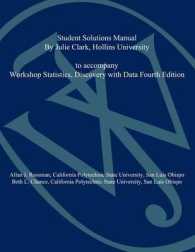Full Description
The Coronavirus disease 2019 (COVID-19) is one of the challenges the world is facing right now. It has seen an unparalleled spread within a short span of time, and claimed victims in many parts of the world. As the number of confirmed cases skyrockets exponentially, a recent surge of 'bad' behaviours such as xenophobia attacks, propagation of misinformation, and panic-buying of essential items have become increasingly commonplace. Panic and chaos reigned as the world witnessed unprecedented moves by countries to close their borders and implement strict quarantine orders in a desperate attempt to mitigate the spread of the coronavirus.COVID-19 has impacted many different aspects of society, from politics and economics to the psychological well-being of citizens, and the list will continue to grow as the spread of the coronavirus persist. While it is impossible to fathom the way COVID-19 will change our usual way of life, there are prevailing concerns that the community currently faces. What are the psychological impacts of a pandemic? How do we enhance the collective resilience of the community during a pandemic? How do we cope with mental health issues during a pandemic? How do we deal with bereavement during a pandemic? How can we support healthcare workers and emergency responders during a pandemic?These are just some of many important concerns that influence the way we cope with the COVID-19 outbreak. There is therefore an urgent need to enhance our understanding and level of preparedness against Covid-19 and pandemic in general. To that end, this edited book, How to Prepare for the Next Pandemic: Behavioural Sciences Insights for Practitioners and Policymakers aims to examine the impacts pandemic have on our society from a behavioural sciences perspective, and to identify solutions that practitioners and policymakers can adopt to combat the spread of COVID-19 in this new operating environment.
Contents
Societal Resilience Related Issues: A Journal of the COVID Year: What Can We Learn from Previous Pandemics? (Denise DILLON and Ghee Kian KOH); What are the Economic Impacts of a Pandemic? (Jose M L MONTESCLAROS); Enhancing Collective Community Resilience Throughout a Pandemic: Insights from Singapore (Pamela GOH); Mitigating the Social Pandemic of Xenophobia During COVID-19 (Nur Aisyah ABDUL RAHMAN); Psychological Well-being Related Issues: How to Cope with Mental Health Issues During a Pandemic (Cherie CHAN and Adrian TOH); How to Support People with Mental Health Conditions During a Pandemic (Jonathan KUEK Han Loong); Coping with COVID-19: The Role of Religion in Times of Crisis (Jonathan E RAMSAY); Supporting and Coping with Bereavement During and Post-pandemic (Andy HO, Oindrila DUTTA, Paul Victor PATINADAN, and Geraldine TAN-HO); Digital Communication Related Issues: The Role of Social Media During a Pandemic (Dymples LEONG); Managing the Spread of Misinformation During COVID-19 (Xingyu Ken CHEN); Maintaining Cyber Well-being During a Pandemic (Jessie Janny THENARIANTO); Crisis Management and Communication During a Pandemic: Some Thoughts (Damien D CHEONG and Stephanie NEUBRONNER); Organisational Related Issues: How to Enhance Organisational Functioning in a Pandemic: COVID-19 Lessons in Leadership (Paul ENGLERT); Sustaining Team Morale Amidst a Pandemic: Lessons from COVID-19 (Minzheng HOU); Telecommuting During a Pandemic: Tips for Parents and Caregivers of the Elderly (Vivian SEAH, John YU, and Whistine CHAI); Non-compliance with COVID-19 Safe Distancing Measures: Tips from Crisis Negotiators to De-escalate Situations (Xingyu Ken CHEN, Nur Aisyah ABDUL RAHMAN, and Shannon NG); Future Directions: Surviving the Next Pandemic: Lessons for Humanity (Majeed KHADER);








